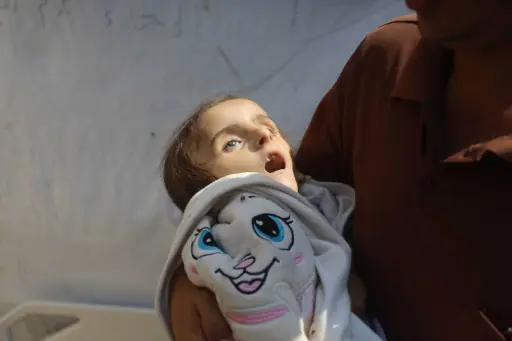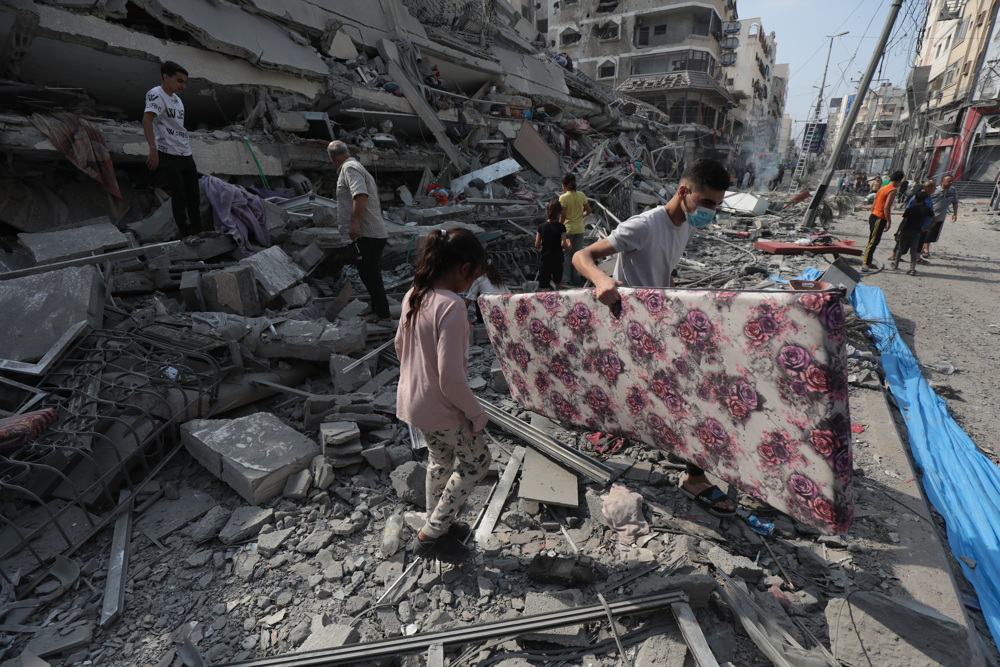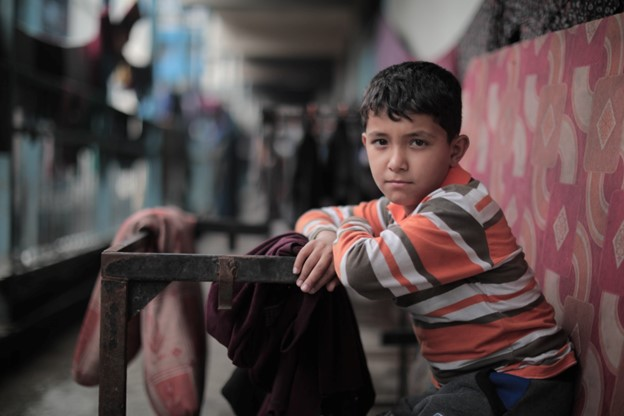Starvation, Disease, and Despair

Relief agencies now say Gaza faces a man-made famine. Since March 2, Israel has imposed a total siege – no food, fuel, or medical supplies are allowed inunrwa.org. Bakers’ ovens have gone cold and market shelves lie empty. The U.N. warns Gaza is on the “precipice of starvation and mass disease”reuters.com. Water infrastructure has collapsed: over 90% of families report no safe waterunrwa.org. The UN Office for the Coordination of Humanitarian Affairs bluntly reports Gaza now gets 0 hours of electricity per dayochaopt.org – clinics cannot sterilize wounds or power incubators, and people cannot boil water. Doctors see preventable deaths from dehydration and illness soaring daily.
Bombed Homes, Broken Lives


Siege Tactics: Hunger, Thirst, and Disease
Gaza is under full blockade. Since early March 2025 no aid or basic goods have entered the Stripunrwa.org. The U.N. repeatedly denounces this as collective punishment. Fuel shortages mean Gaza has no electricityochaopt.org and vital water treatment plants cannot run. Over 90% of households lack safe drinking waterunrwa.org. Toilets overflow and children wade through sewage. With hospitals shuttered or destroyed, even simple infections are becoming fatal. UN reports note that 65% of essential medicines and medical supplies will run out within weeksunrwa.org. One UN health expert warned that if Gaza’s healthcare collapses, diseases like cholera and polio will spread “with horrific speed.” In fact, Gaza health officials say 60,000 children already show severe malnutrition and every day the risk of a disease outbreak growsreuters.com.
Human Rights Watch reports these deprivations are no accident. They found that Israeli forces have intentionally deprived Gaza of water, likely causing thousands of additional deaths, and conclude that this pattern “amounts to” genocide and crimes against humanityhrw.org. Gazans describe it plainly: “It is a war of starvation… They forced us out of our homes… we can either die under their bombs or die of hunger,” said one displaced fatherreuters.com. Relief workers say that every day without electricity, water, fuel, and medicine is literally a death sentence for hundreds of vulnerable people.
Voices from Gaza
“It is a war of starvation,” a father in Rafah told Reuters. “They forced us out of our homes… we can either die under their bombs or die of hunger.”reuters.com “Aid? What aid? We hear about it and we don’t see it,” said another man, describing how his fridge full of food vanished under bombing and now he begs for scrapsreuters.com. Gaza’s health ministry pleads with the world: “Children and patients must not be used as cards of political blackmail,” warned spokesman Khalil Deqran, as malnutrition spreadsreuters.com.
United Nations relief chief Philippe Lazzarini bluntly calls the siege collective punishment, demanding: “The siege must be lifted, supplies must flow in, the hostages must be released, and the ceasefire must resume”reuters.com. He notes Gaza’s entire infrastructure – schools, factories, roads – has been shattered, leaving nothing but a humanitarian graveyard. “These are our people,” says Dr. Mai Alkaila of Gaza’s health ministry. “We see the children dying on the floor of our hospitals. We will not forget.” The cries of Gaza’s doctors, nurses and citizens are clear: every life must count, and Gaza cannot survive under this siege.
International Outcry
Globally, human rights organizations and media are sounding the alarm. A December 2024 report from Amnesty International declared that “Israel’s war on Gaza meets the legal threshold for genocide”aljazeera.com. Human Rights Watch has issued a detailed analysis showing that Israel’s deliberate denial of water and relief likely constitutes extermination and acts of genocidehrw.org. The United Nations has passed resolutions condemning the complete blockade and warning of mass starvation. Doctors Without Borders and UNICEF have expressed horror at the soaring death toll among children, saying nothing short of unrestricted aid and protection will prevent a full-blown catastrophe.
These are not fringe views: they echo what Gazans have long feared and what our conscience tells us. When refugees flee with nothing but the clothes on their backs, and orphaned toddlers go hungry on bloodied floors, we must call it by its name. This is genocide by siege, as defined by international law – the systematic infliction of life-threatening conditions on a population. We must reject euphemisms. True charity means confronting this injustice head-on, not pretending small aid convoys solve a deliberate campaign of violence.
The Cry for Freedom
No amount of food aid will save Gaza unless the fighting stops and the people gain their rights. Palestinians have lived under siege and occupation for decades; Gaza was meant to be a self-governing territory by now. The only real solution to this horror is freedom and dignity for Gaza’s people. When Gazans chant “We want to live!,” they mean freedom from bombs, checkpoints, and occupation. They are not asking for charity; they are demanding the normal human rights that much of the world takes for granted.
We must remember: justice and liberation are the most urgent forms of charity. Helping Gaza means ending the policies that killed, maimed and displaced so many – ending the blockade, allowing Gaza to rebuild, and ultimately granting Palestinians self-determination. Every orphaned child and grieving mother will tell you: survival isn’t enough. Real charity means fighting for the cause of Gaza’s freedom so this horror never happens again.
Call to Action: Protests and Global Solidarity
In the face of genocide, silence is complicity. Now is the time for real charity through action. Across the world, people of conscience must rise up to pressure those in power until Gaza’s crisis ends. We urge activists and concerned citizens to:
- Organize and join peaceful protests everywhere: Gather outside government offices, foreign ministry buildings, and yes – even the official residences of leaders who finance or support this assault. Deliver letters, stand in vigil, and bring Gaza’s message to their doorsteps. Let every head of state hear your voice.
- Demand political accountability: Bombard lawmakers’ offices with calls, emails and petitions. Urge your representatives in Congress, Parliament or Congress to immediately cut off military aid that fuels this war, and to recognize the Palestinian right to live in freedom.
- Spread awareness: Use social media, email, and word of mouth to share credible news, photos, and testimonies from Gaza. Organize community forums, teach-ins or vigils. Insist the mainstream press and your local media report the truth – children starving, homes obliterated, entire families missing.
- Boycott and economic pressure: Refuse to buy products from companies profiting from the occupation. Support campaigns that target corporations or institutions enabling the violence. Let our economic power be a tool for change until Gaza can rebuild in peace.
- Sustain the struggle: This must not be a one-day event. Plan weekly rallies, marches, and online campaigns until Gaza’s freedom is achieved. Build alliances with human rights, labor, faith and student groups – unite behind the cry for justice.
The Palestinian cause is a long-term struggle. We have seen across history that justice can be won when ordinary people persist. By keeping the pressure on – outside parliaments, embassies, and even the homes of decision-makers – we force our leaders to feel the moral weight of Gaza’s suffering. This is more than charity; it is a moral obligation.
Gaza’s children cannot wait. We owe them our loudest voices and our unwavering solidarity. Only by demanding justice and freedom can we turn “real charity” into real change. Stand up, speak out, and never let Gaza be forgotten.
Sources: Verified data and testimonies from UN agencies, Reuters, Al Jazeera, Human Rights Watch, Amnesty International, and other credible reports underpin the above accounten.wikipedia.orgunrwa.orgreuters.comunrwa.orghrw.orgaljazeera.comreuters.com, along with harrowing eyewitness footage and NGO investigations.